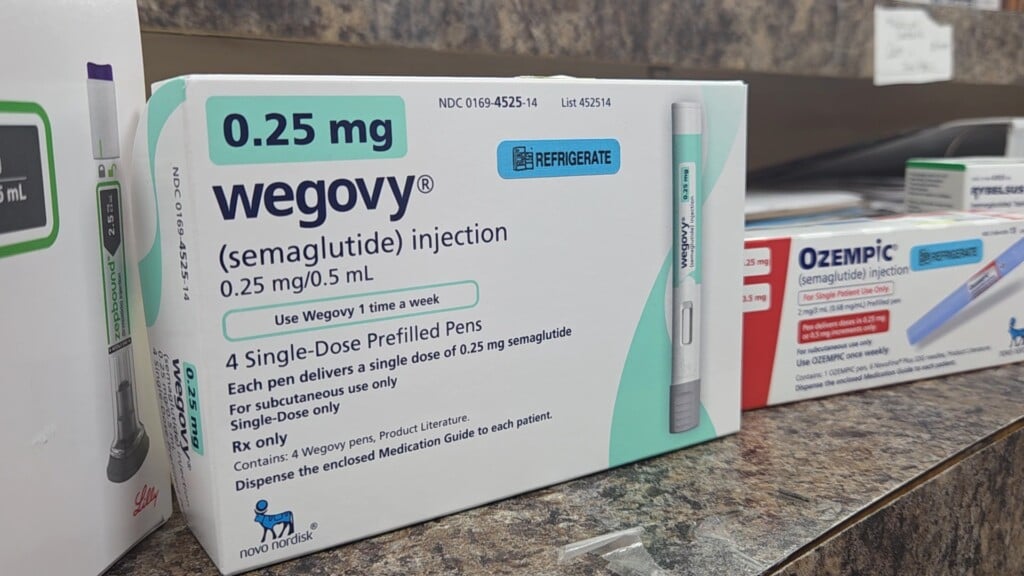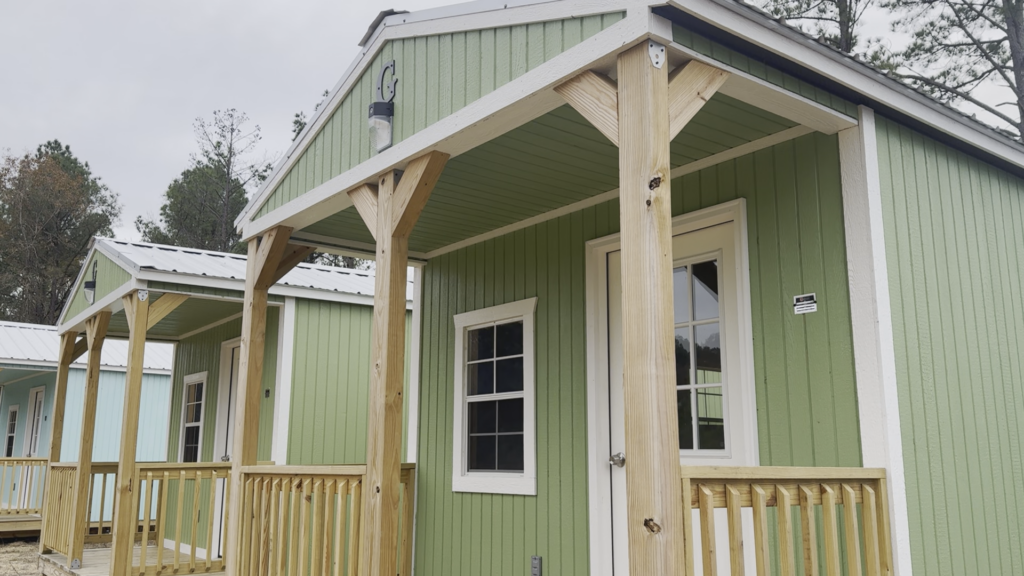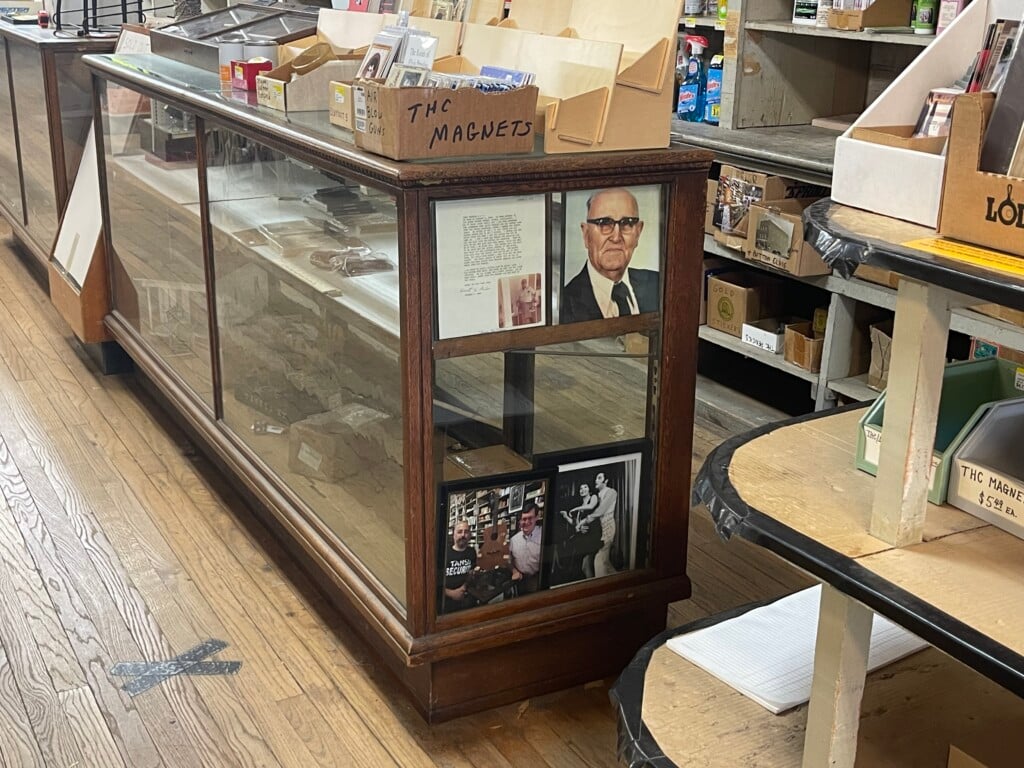MSU Dig Team Flees Violence in Israel

Top: Tension between Israel and Gaza escalated into violence while the Mississippi State University team was in the country. These vapor trails mark Hamas missiles fired into Israel and intercepted by Israel’s defense system known as the Iron Dome. On occasion, a hit creates a smoke ring, visible in this photo taken over the MSU dig site at Khirbet Summeily. (Submitted Photo/Christopher Howell); Bottom left: At sunrise, Jimmy Hardin, Mississippi State University associate professor of archaeology, looks over the university’s dig at Khirbet Summeily in the Negev Desert near Beersheva in southern Israel. (Submitted Photo); Bottom right: Lydia Buckner, a senior anthropology major at Mississippi State University, works on an excavation site in Israel. (Submitted Photo)
“We had a front-row seat to a terrible situation,” said Jimmy Hardin, MSU associate professor in the Department of Anthropology and Middle Eastern Cultures and organizer of the Hesi Regional Project. “We could see in the distance the missiles headed to Beersheva, Ashkelon, Ashdod, Tel Aviv and Jerusalem, and we could see the Israeli missiles, the Iron Dome, going up to intercept them.”
Since 1983, MSU’s Cobb Institute of Archaeology has sent teams to do archaeological work in Israel and Jordan every year possible. Although this year’s team was away from areas targeted by missile attacks, it had to evacuate the country one week ahead of the ground war between Hamas in Gaza and the Israelis.
“When we thought a ground war was inevitable, we decided to get the students out right away,” Hardin said. “Our Study Abroad office at MSU was fantastic. When co-director Jeff Blakely of the University of Wisconsin and I felt that it was time to get the students out, Study Abroad had their tickets arranged for them the next day.”
This summer’s dig started out as a routine excavation of a site MSU research had discovered in 2008 and identified as of interest. Groups excavated at the site in 2011 and 2012, and a team spent two and a half weeks of a planned five-week dig there in June and July.
Hardin and Blakely lead the 43-person Mississippi State team, including MSU personnel, volunteers and graduate and undergraduate students, some from other universities across the U.S.
The MSU team’s excavation work began June 23 in southern Israel in the Negev Desert close to Beersheva. Gaza is about 10 miles to the west of the site, and the entire country of Israel is only about 25 miles wide at that point.
The dig, part of the Hesi Regional Project, is an excavation expedition to the site of Khirbet Summeily. Previous finds at this small site have dated to the Iron Age, as early as the 11th century B.C., which corresponds to the beginning of the Biblical time of the Old Testament kings.
“One of the neat things about digging on these sites in the Middle East is the volume of material you get,” Hardin said. “There is so much material left by past cultures in the Middle East. Even on this little site, we are finding tens of thousands of pottery shards, Egyptian artifacts and local materials from the coastal plain, which is ancient Philistia, and the Hill Country, which is ancient Judah.”
MSU has a license from the Israel Antiquities Authority to conduct archaeological digs and bring some items out on loan for further study. Hardin said only about seven institutions in the U.S. specialize in the archaeology of Syria Palestine and are granted such licenses. MSU’s peers include Harvard University, the University of Chicago and the University of California, Los Angeles.
“This is a unique chance for us to go to the Middle East and do research, but it comes with a set of problems that can be quite daunting,” Hardin said of logistics and political instability.
While the dig was going on each day, trip organizers kept a close watch on unfolding world events.
“There was nothing that seemed different than any other season when we started putting together this project,” Hardin said. “But while we were there, the Israelis found three missing teenagers had been kidnapped and murdered in the West Bank, and several Israelis retaliated with the murder of a young Palestinian.”
Tension and violence escalated, and soon there were missile and mortar attacks on Israel from the Gaza Strip, which prompted Israel to strike back with jets and missiles. Hundreds of missiles were soon flying every day.
“Up until the time we sent the students home, we had well-placed people in the American consulate and embassy in Israel that were telling us they expected this situation to de-escalate, but things kind of took on a life of their own,” Hardin said.
The MSU team continued to work while Israeli tanks and troops streamed toward the Gaza Strip and missiles landed in parts of Israel and Gaza. The booms of their explosions formed the soundtrack to the team’s daily work.
“All our students held up really well, and none were ready to leave, but our constant concern was for their safety and for the worry their parents were experiencing,” Hardin said. “We were very fortunate to be well-situated in an area that received no missile strikes.”
Lydia Buckner is a senior anthropology major at MSU from Fannin, Mississippi. She said the trip to Israel this summer was an opportunity to turn her dream of becoming an archaeologist into reality.
“You can read textbooks and get tested on stuff all year long, but you will never know how it is truly done until you get your hands dirty,” she said.
Buckner said the trip immersed her in a different culture with different values, beliefs and language.
“I loved every bit of it. It also made me have more appreciation for my country. I took freedom and peace for granted so much,” she said. “It was really hard coming back into this quick-paced lifestyle where people don’t really seem to have time for each other or take advantage of the voice and freedom that they have.”
While the experience did not turn out as expected, Buckner said she has no regrets.
“I felt like I was exactly where I was supposed to be — where God wanted me to be,” she said. “I felt like the kibbutz [a communal farming village where the team stayed] was the safest place we could be in the entire country. Not once did I feel scared or that I was in any immediate danger. In fact, my parents and I have tickets to go back within the next year.”
Kristen Bloom, Study Abroad coordinator for the MSU International Institute, helped most of the students arrange their travel before they left and was key in getting the whole group safely back home.
“We asked Jimmy to maintain constant contact with us, and he called in every day,” Bloom said.
MSU’s Office of Study Abroad promotes internationalization on campus and helps with risk management of students and faculty members when they travel with programs abroad. Bloom was part of a crisis committee that worked with Hardin, university legal counsel and others to monitor the situation and determine what action should be taken.
She praised the cooperative nature of the students and their parents as Study Abroad worked during this deteriorating situation and scrambled to rearrange travel itineraries for home.
“It is a testament to Jimmy that a lot of the students were truly disappointed to have to leave the dig site early,” Bloom said. “He could not have been a better faculty member to lead these students abroad.”
One week before the ground war began, the call was made to get the undergraduate students out. The graduate students and staff members came out in groups next, leaving Hardin, Blakely and a contractor from Missouri to close down the site.
“It’s a big deal to get out of the field,” Hardin said. “Three of us did in one week what usually takes a team of 15 a week and a half to two weeks.”
By the time he was ready to leave the country, the ground war was underway, and no American and few European airlines were flying into the country. Flight cancellations were in reaction to the Malaysian Airlines jet that was shot down July 17 in Ukraine. Bloom, who had already handled travel arrangements for the rest of the team, found a way to get Hardin home.
“At the last minute, we just had to buy him a plane ticket on El Al, the Israeli airline,” Bloom said. “Probably the only person more relieved than me when he made it back safely was his wife Orly.”
Gregory Dunaway, dean of the MSU College of Arts and Sciences, said the Cobb Institute of Archeology and the Department of Anthropology and Middle Eastern Cultures have, in tandem, created extraordinary opportunities for faculty scholarship and student training and research.
“The Cobb Institute’s longstanding relationship with the Israel Antiquities Authority is truly unique and has allowed for one-of-a-kind experiences for hundreds of students over many years,” Dunaway said.
Despite this year’s adventure, MSU’s archeological work in this historically troubled region has been relatively immune from conflict.
“The College of Arts and Sciences is extremely proud of professor Hardin’s leadership, as well as his staff’s efforts in ensuring that the expedition’s entire team and the students were safe and kept from harm’s way,” he said. “The college is also extremely grateful for the tireless efforts of the staff of the Office of Study Abroad in assisting the expedition team to return home safely.”





Leave a Reply